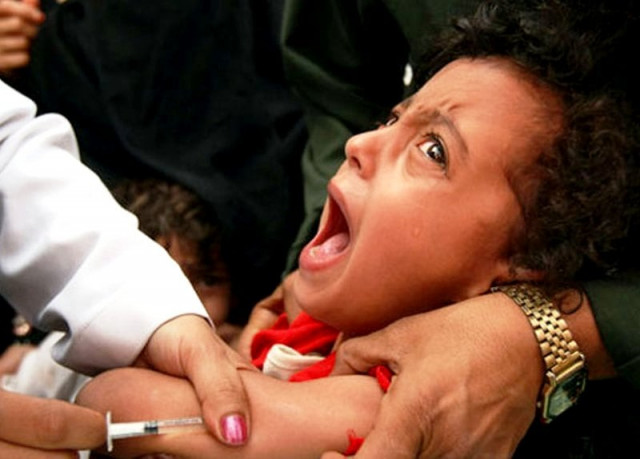Damage control: Team from AKU visits measles-stricken areas
Doctors help families identify symptoms and assist local medical teams .

PHOTO: REUTERS / FILE
The team led by pediatrician Dr Ali Faisal Saleem, worked closely with local administrators, physicians, nurses and vaccinators to optimise treatment of the children with measles at public hospitals and health centres.
During their 10-day stay, the team noted that the factors contributing to the high death rates included inadequate supplies of medicines, shortage of measles vaccine and medical staff, malnutrition, and frequent electricity failures.
“During our interactions with families, we advised them to visit a doctor immediately if their child develops fever with rash or if they suspected measles,” Dr Saleem told the media on Thursday. Initial symptoms, which usually appear ten to 12 days after infection, include high fever, runny nose, bloodshot eyes, and tiny white spots on the inside of the mouth.
“Since measles is a highly contagious disease, parents should keep the affected child away from other children, especially those who are less than one year old,” said Dr Saleem. He reiterated that the best prevention is two doses of measles vaccine, the first at nine months and the second between 12 and 24 months.

Commenting on the outbreak, Dr Anita Zaidi of the Paediatrics and Child Health Department at AKU, said that it was shameful that in this day and age, children were dying of measles - a disease easily prevented by vaccines.
A high-quality measles vaccine campaign should take place every two year with proper monitoring to prevent this disaster from ever happening again, she said.
According to the World Health Organization, there is no specific treatment for measles and most people usually recover within two to three weeks. But in malnourished children and people with reduced immunity, measles can cause serious complications, including blindness, encephalitis, severe diarrhoea, ear infection and pneumonia. The AKU team emphasised the need for nutritional rehabilitation programmes at the hospitals in the affected areas.
Published in The Express Tribune, January 25th, 2013.



















COMMENTS
Comments are moderated and generally will be posted if they are on-topic and not abusive.
For more information, please see our Comments FAQ